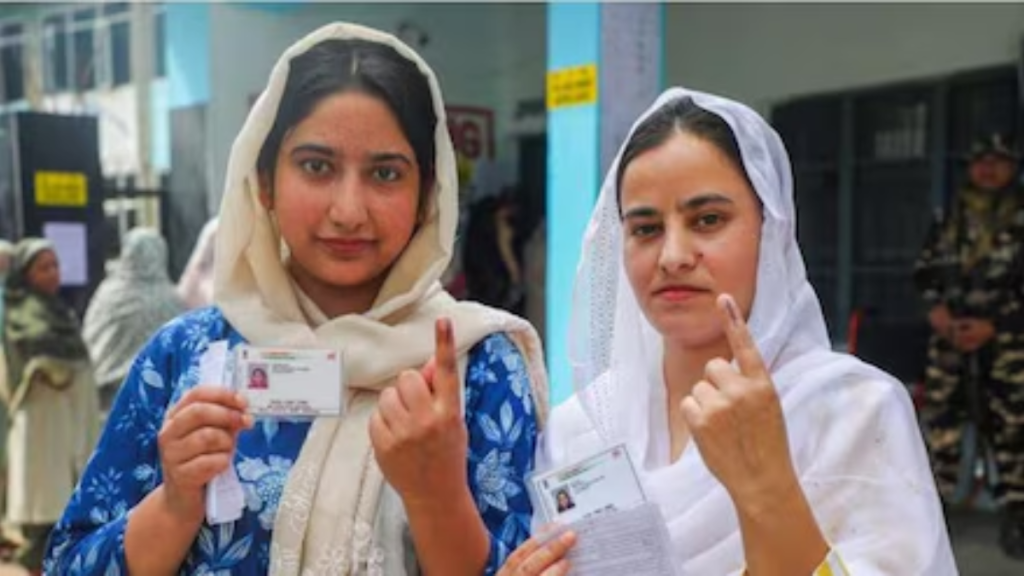By Farooq Wani
The three-phased election held in the Union Territory of Jammu and Kashmir in September and October to install a new assembly is over and in a sense, the restoration of statehood to the once unstable and volatile region is expected to take place in the coming days.
Polling was held on September 18 and 25, and on October 1 to elect 90 members to the Jammu and Kashmir Legislative Assembly. J&K had its last assembly elections in November–December 2014 and now the new incoming assembly will have a plethora of issues to tackle, the key among them being whether a duly elected “state government” will take the step of rescinding a central government and parliament decision to revoke an article of the Indian Constitution that had controversially granted the region Special Status for 65 long years (Article 370).
NC leader Omar Abdullah, who is expected to be the state’s next chief minister, has already stated that there is “no chance” of getting Article 370 back, and that it would be “foolish” to expect the restoration of the Article from a party that revoked it, which suggests that the NDA government at the Centre has covered all bases on this issue legally and is still on a strong footing. However, Abdullah has opined that the fight for restoring Article 370 will continue. He has said that he is pinning his hopes on political circumstances undergoing a change in the near future to facilitate the Article’s restoration. The Congress has opted to remain silent on this, preferring to limit itself to only talking about restoring statehood. The BJP, on the other hand, maintains that Article 370 is “history”.
That the National Conference-Congress Party alliance have stuck together to secure a majority vote in the elections has to be seen not only as a remarkable achievement, but also as a thumbs up for democracy. These elections in J&K have sent out a message to the world that democracy is vibrant and thriving in India in spite of the many internal and external challenges it is faced with.
These elections have to be seen as a win-win for the people of J&K who delivered a strong message to the political class that they need to move away from the narrative of “alienation and boycotts” and promote free, fair and just engagement to achieve the overall non-negotiable goal of socio-economic wellbeing for all, irrespective of community, position, caste or creed.
We can now expect a period where talks and negotiations between the ruling National Conference-Congress combine, the office of the Lt Governor (Manoj Sinha) and the Centre will be tough and stretched as both sides will be dealing with several structural constraints that have put in place through the Jammu and Kashmir Reorganisation Act, 2019. Lt Governor Sinha has already been armed with a series of powers provided to him via “recent amendments” to transaction rules. How both sides negotiate the path ahead for a better tomorrow in J&K will be watched with keen eyes.
At the heart of the ensuing political and administrative tussle is the move by the Centre to give the Lt Governor the power to nominate an additional five members – two women, two Kashmiri Pandits and a displaced person from Pakistan Occupied Kashmir (POK) – to the J&K Legislative Assembly, thus increasing the total number of seats from 90 to 95? These five MLAs, according to a J&K Delimitation Commission and Central government order of 2023 “will hold full legislative powers and privileges, just like elected representatives”. Naturally, politicians in J&K have described this order as unconstitutional and undemocratic as they believe that all legislative powers, including the authority to nominate MLAs, must shift to the elected government after poll results and not remain within the purview of the Lt Governor.
Elections 2024 showcased the absence of violence & coercion, a large voter turnout, widespread participation of political aspirants and parties and intense campaigning on the ground. The Election Commission of India (ECI) deserves kudos and credit for conducting this round of assembly elections with precision and discipline, and complete impartiality, as is to be expected in a vibrant democracy that India is.
The voter turnout in the three phases of polls in J&K was 61.38%, 57.31% and 69.65% respectively. It confirmed that this process of voting in the face of a number of unresolved issues was not an aberration, but a remarkable achievement reflective of the enthusiasm of the local electorate. In all, 873 candidates were in the poll fray for the 90 seats that were up for grabs.
The overwhelming demand for the restoration of statehood is a point on which almost all parties, including the BJP, agreed. This is a good sign for the region, albeit a challenge for the political class. The latter now has a duty and a responsibility to respect the overwhelming trust that the public has shown in them to deliver on societal concerns, economic needs and ensure a safeguarding of fundamental rights as declared and mentioned in the Indian Constitution.
Father of the Nation Mahatma Gandhi once said, “To safeguard democracy,” a people “must have a keen sense of independence, self-respect and their oneness”. No doubt a justifiable ideal to live by provided the spirit of democracy and the socio-economic benefits that accompany it, is respected and not compromised.
J&K has to an extent reflected this Gandhian spirit and the results are there for all to see.
The author is Editor Brighter Kashmir, Author, TV commentator, political analyst and columnist
Disclaimer: Views expressed are personal and do not reflect the official position or policy of FinancialExpress.com Reproducing this content without permission is prohibited.

